
THE VOICE OF INTERNATIONAL LITHUANIA
|
VilNews has its own Google archive! Type a word in the above search box to find any article.
You can also follow us on Facebook. We have two different pages. Click to open and join.
|
Author Archive
Even those who disagree with him believe Gorbachev to be honest and not corrupt
- Posted by - (0) Comment
![]()

Former Soviet President Mikhail Gorbachev turned 80 this week
More than twenty years ago I was standing on Moscow’s central Manezh Square and watched in amazement as hundreds of thousands of demonstrators protested the massacre of pro-independence Lithuanian demonstrators in Vilnius on January 13th 1991. At the time everyone in Russia’s chaotic pro-democracy movement was certain – Mikhail Gorbachev was to blame for this horror. For those of us who lived and acted in the 1980s, Gorbachev has two images.
RIANOVOSTI weekly column by Konstantin von Eggert
http://en.rian.ru/columnists/20110302/162828866.html
- Bookmark :
- Digg
- del.icio.us
- Stumbleupon
- Redit it
Gorbachev’s foreign policy changed map of Europe
- Posted by - (1) Comment
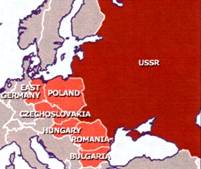
Columbia University's Robert Legvold says historians will argue about why the Cold War ended or why the Soviet Union collapsed.
“My own view is that when you look at the story, especially when you try to explain the timing, that is why it occurred from 1985 to 1989 as opposed to 10 years later, 15 years later, when you try and explain the timing, I think it is very difficult to do that without giving a lot of credit to Gorbachev and what he did during that period," he said.
Washington Post
http://www.voanews.com/english/news/europe/Gorbachevs-Foreign-Policy-Changes-Map-of-Europe-117417398.html
- Bookmark :
- Digg
- del.icio.us
- Stumbleupon
- Redit it
|
|
When we first posted the recipe for Kugelis 26 February we had no idea that it would result in so many responses and Emails. It seems that what is in question is the origin of Kugelis. Some say that the origin of Lithuanian Kugelis is from Kugel which is a very popular traditional dish of the Jewish Faith with the only difference being that Kugelis is with meat and Kugel is without. To compound the issue there is the very old traditional Lithuanian dish called Bulvių Plokštainis whose recipe is absolutely identical to Kugelis. We would like to highlight this recipe for a number of reasons. One reason is that no matter what you call it or where it came from it is a delicious and easy to make dish. The other reason is that we think it would be very interesting to find out from our dear readers any input they could share in regards to the origin of these three dishes – Kugel, Kuglis and Bulvių Plokštainis |
- Bookmark :
- Digg
- del.icio.us
- Stumbleupon
- Redit it
Lithuania will be empty by year 2043…
- Posted by - (1) Comment

According to a new report from STATISTICS LITHUANIA there are now officially 3.24 million people resident in this country. That is about 100,000 fewer than a year ago.
If emigration continues at the same pace over the coming years, Lithuania will, in other words, be completely empty of people in 2043. And these are only the official statistics. Reality is probably even worse.
It is no longer a question of emigration but of evacuation...
- Bookmark :
- Digg
- del.icio.us
- Stumbleupon
- Redit it
“Last out, please turn off the light”
- Posted by - (0) Comment

This phrase was written next to one of the many openings penetrating the Berlin Wall in 1989, in the eve of East Germany’s collapse, and this is our today’s polite energy-saving call also to the last one who leaves Lithuania. Or maybe there is another, better choice?
What about:
“First in, turn the lights on!”
- Bookmark :
- Digg
- del.icio.us
- Stumbleupon
- Redit it
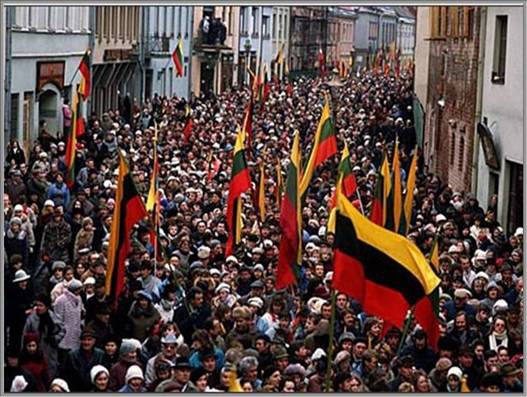
Lithuanians rejoice over their newfound independence on 11 March 1990.
Here from Pilies Street in Vilnius Old Town.
I can very well imagine that many of those who signed the declaration act that March day 21 years ago did it with trembling pens. They knew what power they challenged, and they were certainly fully aware of what reprisals they and the people they represented could expect from the big bear in the east. The Soviet Union was not a superpower to joke with or irritate, and the signatories knew that they would not be treated with kid gloves if the bear decided to strike back, reacting to the severance requirement that was signed in Lithuania’s Parliament that day.
But they signed. They were brave. Without their signatures on the document shown below, it is quite possible that Lithuania, Latvia and Estonia still today would be unfree republics under the 'protective' bear paws.
The Declaration of Independence on 11 March 1990 was Lithuania’s second in the 20th century. The first one was signed on 16 February 1918. Both statements were signed by wise and courageous political leaders who did not want to accept that their beloved homeland would remain occupied.
When Lithuania by the end of the 1930s celebrated the 21st anniversary of the century's first freedom declaration, a united country could proudly say that both politicians and society as a whole had succeeded in recreating a strong and progressive nation in the years that had passed since 1918. I have been told that Lithuania in the middle-war period had the world's fastest growing economy, and I know with certainty that this nation was fully on par with, perhaps even ahead of, its neighbours in Scandinavia and the rest of Europe when World War II so brutally overthrew and destroyed the fine Lithuanian nation which had been redeveloped during the pre-war years.
So now I ask you, ye who on the 11th of March 1990 signed the document below: Can you honestly say that you are satisfied with the Lithuania that has evolved over the past 21 years? Can you with the same force as the country's pre-war leaders say that you have done a good job of recreating a Lithuania you and the entire nation can be proud of? Are you satisfied with how 'The Lithuanian House' has been cleared and cleaned after the 50-year nightmare under Soviet supremacy came to an end? Is it not true that there still remains the same old kind of Soviet dust in nearly all corners of the House?
Please allow me to doubt if you can claim with conviction that you are satisfied with today’s state of affairs in Lithuania. I admit that I sometimes have been disappointed seeing that you, who so bravely defended a free Lithuania in 1990, have not been more critical to the country’s leading authorities over the latest 20 years, even as Lithuania continues to suffer under 'stupidity curses' such as corruption, greed, selfishness, cheating, distrust and lack of teamwork, mutual respect and honest care. I believe you have seen that far too many of Lithuania’s leaders have been caring more about their personal benefits and positions than about the nation, and I wish you had reacted firmly against such behaviours.
I wish all the best for you and for Lithuania. But I would like to see a thorough clean-up action before I can fully express my joy and pride for this country. You were brave and wise in 1990. Please be that again. I urge you to think about Lithuania's future generations. I ask you to make a new commitment, as important as the one you signed on 11 March 1990. I urge you to stand up as guarantors for a Lithuania without deceit and cheating.
I kindly ask you to once again climb up to the very same barricade top you so proudly stood on in 1990. This time not to be set free, but to be bound – bound to pressure our present day politicians and leaders to accept a commitment to a cleaner and brighter development process in and for Lithuania.
The independence declarations of 1918 and 1990 were signed by wise and courageous political leaders who did not want to accept that their beloved homeland should remain occupied. Today there is a need of a document that declares another but not less important deed – making it perfectly clear that you, the proud signatories of the 11 March act, DO NOT ACCEPT that this country remains corrupted and mismanaged in so many areas.
Please do not let the date 11 March 1990 go down in history with less importance than it deserves…
Aage Myhre
Editor
- Bookmark :
- Digg
- del.icio.us
- Stumbleupon
- Redit it
The significance of 11 March 1990
- Posted by - (3) Comment
|
|
|
|
Professor Vytautas Landsbergis |
Lithuanians rejoice over their newfound independence. |
11 March 1990 is deemed to be remembered as one of the most important days in Lithuanian history. It was on this day 20 years ago that the Lithuanian parliament declared renewed freedom and independence for Lithuania, after the country had been occupied by the Soviet Union since World War II. 124 Parliament delegates voted for the declaration (copy below), while six were absent.
The Parliament elected at the same time Professor Vytautas Landsbergis, the leader of the liberation movement Sajūdis, as Parliament President. He won over the Communist Party leader Algirdas Brazauskas with a 91 to 38 vote.
11 March 1990 became a milestone in Lithuania's history because the Lithuanian politicians that day clearly demonstrated the country’s willingness to again become free and independent. Although it took another 18 months before the international community approved the nation’s independence from the Soviet occupying power, it was the 11 March actions that made it clear to the world that Lithuania no longer accepted to be incorporated into a system and a Commonwealth it had been involuntarily incorporated into when the World War II drew to an end.
11 March 1990 was in many ways the day when Lithuania’s new freedom began, and we must believe that this country now will remain free and sovereign for all time based on democratic principles and values corresponding to those having been developing in Western Europe after World War II ended in 1945.
While this March day 20 years ago was the beginning of the new time in and for Lithuania, the day was also symbolising that nearly 200 years of tragedies of and for this country had come to a final end.
Through more than 500 years, from the 1200s when King Mindaugas declared Lithuania one nation, until it was occupied by the Russian Empire in 1795, Lithuania had been a proud and free nation, through some 300 years also one of the world’s greatest powers, stretching from the Baltic to the Black Sea (known as the Grand Duchy of Lithuania).
The 123 years of occupation from 1795 to 1918, however, became a long and sad chapter for Lithuania, since much of the good qualities this nation once represented in the world community were attempted to be systematically broken down by the Russian Empire occupants.
When Lithuania at the end of World War I (1914-1918) on 16 February 1918 again could declare itself a free nation, most Lithuanians probably believed that the newly won freedom would remain, but sadly, the new freedom lasted only for 22 years. Vilnius and the surrounding area was occupied by Poland already in 1920 and remained under Polish rule until the Second World War started in 1940, and Kaunas was therefore the capital of Lithuania for the years 1920 – 1940.
Nevertheless, Lithuania grew to become a strong nation during the interwar years, guided by, among others, the most famous Lithuanian leader of those days, President Antanas Smetona.
World War II and the years just after became extremely tragic for Lithuania, when the nation was torn apart under alternate German and Russian occupation, and virtually all the large Jewish population was wiped out, and Lithuania thereby lost a population group that had meant so much for this nation since the 1300s.
Also, during the war, tens of thousands of Lithuanians fled to the west, many who today live in the United States, Australia and other countries. Lithuanians were also exposed to extremely tragic abuse from Stalin's Soviet troops and his secret police (known as the KGB), when more than a hundred thousand Lithuanians were deported to Siberia and other areas in the Soviet Union where many of this country’s great citizens were killed or died during very shameful and cruel conditions.
Already during the WWII years a strong resistance movement occurred, known as the Forest Brothers, who until the middle of the 1950s fought a heroic struggle against the Soviet power from their hiding places in the Lithuanian forests. It is suggested that around 20,000 Lithuanians and 70,000 soldiers from Stalin's Red Army and the KGB were killed during those post-war years.
Lithuania became in 1990-1991 the first country that managed to detach itself from the Soviet Union. Latvia and Estonia followed soon after. We should all today be proud that this little country so bravely dared to stand up against the powerful Soviet powers. We should all be extremely happy that this little nation again enjoys freedom and democracy under the principle of equality for all its citizens, and we should be happy about the fact that 11 March 1990 was the day when Lithuania could finally put behind itself nearly 200 years of atrocities and suffering for its people – a people that had deserved so much better due to its proud history.
The Lithuanian Independence Act of 11 March 1990.

- Bookmark :
- Digg
- del.icio.us
- Stumbleupon
- Redit it
Lithuania 2011: A Republic Come-of-Age
- Posted by - (0) Comment
by KR Slade
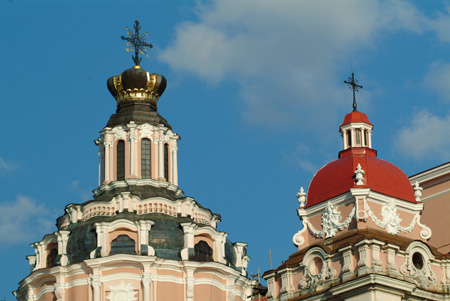
The 11th of March 2010 was the 20th anniversary of the re-independence of the Republic of Lithuania. The original Republic of Lithuania (which arose from being a part of Czarist Russia since 1795) existed from 1919 until 1939, and had ceased to exist with the invasion of the Nazi’s. Post World War II, there was Lithuania’s 50-year forced annexation into the USSR -- as the nominal Republic of Soviet Lithuania. In 2010, the re-emerged Republic of Lithuania has become an ‘adult’ in the family of nations.
However, in history, a true-and-complete nation does not emerge instantly upon the finite occasion of a small group of men signing a document that declares national independence . . . compare the USA declaring its independence in 1776 and not ratifying its first constitution until 1790. In Lithuania, it took three (3) years from declaring independence until the Russian troops finally left the country . . . there was a long process (with considerable difficulties and hardships) to establish the workings of a functional government . . . to change from the Soviet to a market economy . . . to resolve a half-century of oppression of the people . . . to emerge from behind an Iron Curtain . . . to internally rediscover and redevelop the nationhood . . . to become a true member of the family of nations. Moreover, much of such work is only begun . . . democracy is always an on-going effort.
This coming-of-age for Lithuania, from the end of the 20th century into the first decade of the 21st century, has not been always easy, nor has it been always smooth . . . there were a number of delays, intervening influences, setbacks, and poor decisions. Everything considered, Lithuania has done a remarkably good job . . .
Some Obvious Achievements
The physical infrastructure is greatly improved. The cities have most of their old buildings restored, and they are lovely. Modern structures are everywhere. Most apartment buildings have had at least some basic renovation. New homes fill the cities and suburbs, and even in many villages.
The arts, national culture, and the Lithuanian language are thriving.
The significant problem with discarded-trash is now much lessened. The simple solution of the placement of trash-collection receptacles has changed the behaviour of people; it is only a couple of years since depositing trash (or even a cigarette butt) on the street will evoke a rebuke by any witness. The discarding of empty plastic / metal / glass containers (usually for alcohol) has been vastly eliminated by the fact that such containers have become recyclable for cash payment; a volunteer ‘army’ of the poor, as their full-time employment, gathers the discarded now-valuable items.
Incoming tourism is developed. In Soviet times, there was one hotel in Vilnius; now there are dozens, which are all completely restored, or newly built. Restaurants, bars, cafes, entertainment, each of all types, are everywhere. There has been some development in rural tourism. Lithuanians like to escape to the countryside, and to travel -- throughout Europe and beyond.
Some Political Ineptitude
The number of governments has equalled the number of years of independence. Political instability is evidenced by the frequent changes in power, and the fact of numerous political parties -- some of which are created at a weekend meeting and may function for a dozen months. Political parties are often less than a group with a common political ideology, and often more of a group of uniting common friends.
There was significant crime, not only petty and major crime, but also organized crime. A few years ago, there were constant news reports of robberies, especially of jewellery stores and banks. Extortion and ‘protection’ crime was widespread. More recently, such instances have become rare. However, it seems that many criminals from Lithuania have migrated to other countries, especially to the other EU states; Lithuanian nationals abroad suffer from discrimination as a result.
There was vast corruption, from the lowest to the highest levels of government. A free press has reduced some of this corruption. Police corruption has been reduced, by the courts simply paying the police officer for the conviction of bribery attempts. EU standards and controls have reduced corruption.
In 2004, the President was impeached and removed from office. He is now a member of the European Parliament. Questions remain and are still being litigated about that ‘impeachment’; or, was it a ‘coup’?
A couple of years ago, the leader of one of the largest (and newest) political parties was criminally charged with election offenses, and removed from his elected office; although he was never convicted. He is now a member of the European Parliament.
After extensive denials from all individuals (except the current President) and from all levels of government, in late 2009 a parliamentary inquiry establish that in the last ten years there were in the capital city of Vilnius at least two (2) secret US prisons, for ‘rendition’ of captives from other countries. The first such prison was a small ‘guesthouse’ that operated since 2002. In 2002, President Bush visited Lithuania. In March 2004, Lithuania was accepted into NATO. There was a larger secret-prison facility (currently owned by the Lithuanian secret service) that operated from September 2004 until November 2005. Valdas Adamkus (a Lithuanian-born American citizen, who is apparently not an ‘ethnic Lithuanian’) was President from 26 February 1998 until 25 February 2003; he was soundly and surprisingly defeated for re-election. Rolandas Paksas was President from 26 February 2003 until his impeachment-removal on 6 April 2004. There is corroborated testimony that Paksas was informed about a future secret prison, and that he refused to give his permission; thereafter, there was a campaign to remove him on the grounds of his alleged improper ties to Russia. The interim/temporary (i.e., 6 April 2004 until 12 July 2004) President, Arturas Paulauskas, denies any knowledge of any secret prisons. Adamkus was re-elected in a close vote, where his opponent was seen as pro-Russian; his second term was from 12 July 2004 until 12 July 2009. Adamkus denies any knowledge of any prisons, and declares that the existence of such prisons has not been proven. The parliamentary inquiry: 1) did not determine that the prisons had ever been actually used, and 2) blamed a couple of high-ranking state-security personnel for allowing the illegal prisons, and recommended their criminal prosecution. This story is not finished . . .
Previous governments created a debacle of authorizing the re-building, in the capitol city, of a ‘restored’ Renaissance facsimile of the Palace of the Rulers, which had been destroyed 100+ years ago. The elaborate structure was supposed to have been completed in the summer of 2009 -- in time for Lithuania’s 1,000-year anniversary of its name as a nation. After spending 100 million Euros, the structure is still not completed, and has been abandoned due to lack of funds.
Since Soviet times, there has been an attempted construction of a large ‘National Soccer Stadium’ in Vilnius. A few of years ago, construction re-commenced during the building boom; then was cancelled; then re-commenced; and again cancelled due to lack of funds. Actually, Lithuania’s national sport is basketball !
As a condition of membership to the European Union, the country’s only nuclear reactor (i.e., a Chernobyl-type design) was closed at the end of 2009. For years, the previous governments did nothing to resolve the issue, apparently believing that by doing nothing the EU would revoke the closure requirement. However, it will take fifteen (15) years to build a new reactor, and construction has not yet begun. Meanwhile, the price of electricity has increased forty percent (40%).
Some Continuing Challenges
The ‘power elite’ of the Soviet era gained great advantages during the transition to a market economy; this elite is now called the ‘nomenclatura’ -- an oligarchy of power and wealth. Lithuania has never faced / admitted to the power and crimes of individuals, since before the end of World War II. There has never been a full ‘lustration’ / transparency of any portion of the last 100 years.
There are unresolved issues of ownership of real estate, and personal property. Throughout Lithuania, there is real estate that does not have a ‘clear title’. Such title problems usually have to do with prior ownership by Jews, who were killed or emigrated during World War II. The Vilnius region is also a source of title problems arising from ownership by Poles, who emigrated after World War II. The title problems have not been settled, and are not going to ‘go-away’.
There are social problems, especially with alcohol abuse. It is only a couple of years since stores cannot sell alcohol after 10pm. Public drunkenness, which was not allowed in Soviet times, is widespread. Domestic violence is a problem. Drug addiction, especially to heroin, is a significant problem. Suicide rates are the highest in the world.
There is unemployment; many businesses that operated in Soviet times have closed, due to being un-economic in the now-globalized marketplace. There is under-employment; people cannot find jobs for which they have qualifications; whereby ‘un/employment statistics’ are not accurate. Moreover, people who cannot find jobs have quit the labour force; therefore, ‘employment statistics’ are further understated. Official labour statistics admit that ‘unemployment’ in the recent-prior twelve (12) months has doubled: to 15+ percent.
There is economic hardship. Until two (2) years ago, there was the ‘bubble’ of expansion, financed by cheap and easy credit and also by expanding markets. In the last 12 months, Gross National Product has decreased by 25%, as officially reported.
There is vast disparity in income levels: the poor have become poorer, and there has emerged an economically-privileged society. A current Lithuanian saying is: “In Soviet times, everyone had money, but there was nothing to buy. Now, some people have much money to buy everything; and many people have no money to buy anything.”
Russian oil, and more-importantly gas, controls the market; prices have constantly increased during the last couple of years.
There is a continuing ‘hold-over’ of Soviet ‘culture’ / thinking / methods / practices. For example: 1) Street addresses are often non-existent, incorrect, confusing / illogical, and unusable; however, there is participation in a new EU project to address this fact that causes problems with deliveries / police / fire / mail / tax collections; 2) Many stores still do not have ‘self-service’; the customer must ask at the counter for what he/she wants; 3) Retail stores usually block their windows; 4) In the villages, stores often do not have a cash register or adding machine; an abacus is used !
Other than the three (3) major cities (i.e., Vilnius, Kaunas, Klaipeda), the smaller cities have had little development. Rural areas have little economic opportunity. Most of the housing for farms and in villages is comparable to the Appalachia region of the USA.
Since ascension to the European Union, there has been a significant emigration, notably of the youth -- in search of ‘economic opportunity’. No one knows the size of the exodus, but it is reasonable to estimate that a minimum of 10% of the ‘pre-EU membership’ population are now abroad. There is also the unknown size of the emigration, mostly Russian, at the beginning of independence; estimates vary between 5--10%. Therefore, since independence, the total emigration is conceivably 15--25% of the population; that is a very large number, which would have a profound effect.
People from abroad, who have a legal and human right to Lithuanian citizenship, by virtue of their Lithuanian ethnicity and/or ancestral citizenship in Lithuania, have been denied their rights to obtain their citizenship in the present Republic of Lithuania. The legislature passes contradictory laws, the ministries of the governments violate the laws, the personnel in the ministries act independently of the laws, and the courts uphold the governments. This ‘Law on Citizenship’ is deja-vous of Soviet-era law. The same people who worked in the Lithuanian Soviet public-service are still working in the Lithuanian Republic public-service.
The Status Quo
There is political dissatisfaction to a considerable degree, since the time of independence. Significant portions of the population see no betterment since independence, and/or no betterment since joining the EU. The Prime Minister is the most-unpopular elected official in the entire country. No political party has a majority; a coalition of three or four parties is always necessary. Legislative focus, at all levels, is frequently ‘populist’. However, in the last two (2) years, the President -- the first woman president, and who is not affiliated with any political party -- is the most-popular elected official: more than 80% approval rating.
During the last couple of years, true-inflation seems to have caused prices to actually double. Higher education doubled; food doubled; cigarettes increased from 1.00 to 6.19 litas; trolleybus increased from .60 to 2.00 litas, and service has been much reduced. Utilities increased 50--60%. Rents tripled.
The banks and communications services are Scandavian-owned.
Gas is Russian-owned.
Oil refining is Polish-owned; oil sales is Russian-owned.
The pharmaceutical suppliers are German/Swiss/French.
The China ‘presence’ is hugely increased. Significant Lithuanian industries have closed, due to far-cheaper Chinese imports. Six years ago, there were fewer than ten (10) Chinese restaurants in Vilnius; now there are dozens. There has been a recent influx of Chinese businessmen, operating their own companies.
Lithuania has one-third more mobile telephones than the number of its ‘official’ population. In the cities, high-speed Internet is widely available, to the highest degree worldwide.
Conclusion
Having reached twenty-one (21) years as a nation, perhaps now it will be time to ‘put aside childish ways’, to not claim ‘youth’ as any excuse, to accept full responsibility for one’s actions / inactions. It is incongruous to claim simultaneously to be ‘a young nation’ and ‘a nation one-thousand years old’.
Since the beginning of the last decade, there was great over-spending by investors, businesses, individuals, and governments. Debt, unknown in the Soviet era, has accumulated; savings has been non-existent. Now, the ‘bubble’ has burst. Beginning two (2) years ago, there is economic hardship that has worsened, and such hardship is not reasonably foreseeable to improve in the very-near future.
In the last six years, I have witnessed great accomplishments in Lithuania. I wish only that I could have been here at the beginning of independence, so that I would have a complete picture of the true progress of Lithuania.
In 2010, the 20th anniversary of independence, following the 2009 celebrations of Lithuania’s millennium and Vilnius as European Capitol of Culture, lead Lithuania into a new era. The events made ready many physical improvements that will last for many years. Far greater than the tangible is the intangible progress, which is permanent, yet but a good beginning for an even far-better future.
- Bookmark :
- Digg
- del.icio.us
- Stumbleupon
- Redit it
Economy Minister Dainius Kreivys resigns – the fog surrounding his resignation still impenetrable
- Posted by - (1) Comment
![]()

“I have been swamped with an avalanche of lies”, said the resigning minister, Dainius Kreivys, at a press conference today.
“I am not indifferent to what Lithuania will look like to our children and grandchildren after 20 or more years”, he concluded.
After a few months of investigation, Lithuania’s Chief Official Ethics Commission today stated that the Minister of Economy, Dainius Kreivys, confused public and private interests while making favorable decisions to support a company in which the co-owner is his own mother. During a press conference held at the Ministry of Economy, Kreivys read resignation statement and briefly commented that he was surprised and disagrees with the findings of the Ethics Commission. The minister affirmed that he intends to appeal the commission’s decision to court. “I have been swamped with an avalanche of lies”, said the Minister of Economy. “I am not indifferent to what Lithuania will look like to our children and grandchildren after 20 or more years”, said Kreivys.
During the latter months the controversial story of Minister of Economy of Lithuania Dainius Kreivys presented more and more questions to discuss. Why is Prime Minister Kubilius defending his minister? What was written in that mysterious note? Is Kreivys to disclose some large scale corruption case? Or, according to weekly newsmagazine Veidas, is he just a scapegoat?
The scandal began in January when media spread the message throughout the country claiming that possessions of the Minister of Economy Dainius Kreivys suddenly increased up to 170 million LTU. Yet, turns out it was just a media canard as no real evidence was found. Then a Chief Official Ethics Commission started the investigation on request of the opposition leader of Seimas Algirdas Butkevičius. In the report D. Kreivys was alleged of confusing public and private interests while participating in making decisions related to the companies whose main shareholder is minister’s mother. The Minister of Economy however refused all the accusations.
To read more, go to Section 9 – LITHUANIA TODAY
- Bookmark :
- Digg
- del.icio.us
- Stumbleupon
- Redit it
Economy Minister Dainius Kreivys resigns – the fog surrounding his resignation still impenetrable
- Posted by - (0) Comment
![]()

“I have been swamped with an avalanche of lies”, said the resigning minister, Dainius Kreivys, at a press conference today.
“I am not indifferent to what Lithuania will look like to our children and grandchildren after 20 or more years”, he concluded.
After a few months of investigation, Lithuania’s Chief Official Ethics Commission today stated that the Minister of Economy, Dainius Kreivys, confused public and private interests while making favorable decisions to support a company in which the co-owner is his own mother. During a press conference held at the Ministry of Economy, Kreivys read resignation statement and briefly commented that he was surprised and disagrees with the findings of the Ethics Commission. The minister affirmed that he intends to appeal the commission’s decision to court. “I have been swamped with an avalanche of lies”, said the Minister of Economy. “I am not indifferent to what Lithuania will look like to our children and grandchildren after 20 or more years”, said Kreivys.
During the latter months the controversial story of Minister of Economy of Lithuania Dainius Kreivys presented more and more questions to discuss. Why is Prime Minister Kubilius defending his minister? What was written in that mysterious note? Is Kreivys to disclose some large scale corruption case? Or, according to weekly newsmagazine Veidas, is he just a scapegoat?
The scandal began in January when media spread the message throughout the country claiming that possessions of the Minister of Economy Dainius Kreivys suddenly increased up to 170 million LTU. Yet, turns out it was just a media canard as no real evidence was found. Then a Chief Official Ethics Commission started the investigation on request of the opposition leader of Seimas Algirdas Butkevičius. In the report D. Kreivys was alleged of confusing public and private interests while participating in making decisions related to the companies whose main shareholder is minister’s mother. The Minister of Economy however refused all the accusations.
Subsequently, Linas Balsys, the spokesperson of the president stated that Kreivys should resign as he politically discredited himself and affects the relations between the president and the government. The president of Lithuania herself confirmed that she distrusts the Minister of Economy. However, the Prime Minister Andrius Kubilius disagreed with the presidential position. After a few days PM Andrius Kubilius had received a confidential note from the Minister of Economy Dainius Kreivys and later on stated that some of the facts shocked him, while the president was rather skeptical about the note and transmitted it to Special Investigation Service. The note was published publicly shortly after the municipal elections. From that time the scandalous story began to grow into a whole new dimension. The whole text is here http://www.alfa.lt/straipsnis/10685182/?Skelbiame.garsiaja.ukio.ministro.Kreivio.pazyma=2011-03-03_12-39 From this note is clear that the Minister of Economy sustained pressure and was offered bribes numerous times. Among all, it also states that Social Democrats urged Kreivys not to check the public procurements related to Vilniaus Vandenys Company and Ignalina nuclear power plant, about objectives of public institutions of Vladimir Romanov to obtain support for Sports Palace renovation and about seeks of “Panevėžio statybos trestas” to change the findings of Public Procurement Office related to the renovation of Royal Palace in Vilnius. Linas Balsys, the spokesperson of the president after all stated that the president is aware of all the names written in that note. However, the opposition leader and the chairman of LSDP (Social Democratic Party of Lithuania), Algirdas Butkevičius commented that disclosed information is a slander and that he considers a possibility to sue Kreivys. Moreover, the opposition already prepared two interpellation projects on PM Andrius Kubilius and Government’s performance which would be considered in Seimas during spring session.
During his resignation speech Dainius Kreivys thanked Prime Minister Andrius Kubilius for the opportunity to work in his team which, according to him, took fatal decisions to improve economy of Lithuania during highly difficult times of economic crisis.
What was left behind the curtains of Lithuanian political scene? The controversial story of minister Dainius Kreivys still leaves more questions than answers.
Editorial team for this story: Diana Koval/Aage Myhre
Sources: ukmin.lt, BNS, Lietuvos Rytas, Veidas, delfi.lt, alfa.lt
- Bookmark :
- Digg
- del.icio.us
- Stumbleupon
- Redit it
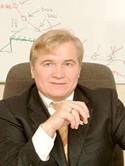
Yury Khardikov a former Moscow city prefect wanted on suspicion of swindling the billionaire wife of the former Moscow mayor said he was granted political asylum in Lithuania. Yury Khardikov — accused of swindling Yelena Baturina of 1 billion rubles ($35 million) in a shady land deal — said prosecution against him in Russia prompted Lithuanian authorities to grant the asylum, Rosbalt news agency reported late Thursday. But Vilnius prosecutors continue a preliminary probe into Khardikov on suspicion of laundering $39 million that he allegedly transferred to Lithuania from Germany, Lithuanian web site Litovsky Kuryer said Friday, without elaborating on the origin of the money. Russian investigators say Khardikov, a former top manager at Unified Energy Systems who became a Moscow prefect in 2007, has led Baturina's company, Inteko, to purchase a land plot of unclear ownership in Sochi in 2005. But his problems only began in 2009, when then-Mayor Yury Luzhkov fired him from the job of the Northern Administrative District's prefect, citing his bad performance on repairing apartment blocks. Khardikov, who was vacationing abroad at the time, opted not to return to Russia, where a case was opened against him later the same year. Khardikov was placed on the international wanted list on large-scale fraud charges, punishable with up to 10 years behind bars, in late 2009. He has arrived in Lithuania in 2010 and spent a month under arrest there on suspicion of money laundering, but was later released from detention, Litovsky Kuryer reported. Khardikov said at a press conference late January that he expects the Russian case against him to be closed following Luzhkov's dismissal in September, Rosbalt said. But he also complained that Lithuanian authorities were "stifling" his business by freezing his bank accounts and confiscating his passport over the money laundering case. Luzhkov requested a residency permit in another Baltic state, Latvia, after his being fired, but authorities of the country he often lambasted on political grounds in the past refused his request in January.
Source:
http://www.themoscowtimes.com
- Bookmark :
- Digg
- del.icio.us
- Stumbleupon
- Redit it
![]()

Jeremiah Cullinane
Lithuanian book smugglers are in focus in Chicago this week, when Jeremiah Cullinane's Irish-Lithuanian documentary BOOK SMUGGLERS revisits the 19th-century rebels who conspired to preserve their literary tradition amid the enforced Russification of Lithuania
- Bookmark :
- Digg
- del.icio.us
- Stumbleupon
- Redit it

EUROPE’S strongest man Žydrūnas Savickas is Lithuanian. But EU’s strongest economy is clearly German. The two have more in common than you think. Both are breaking records and are familiar with lugging around dead weight.
Read more at
http://www.cityam.com/markets-and-investments/pulling-dead-weight-through
- Bookmark :
- Digg
- del.icio.us
- Stumbleupon
- Redit it
63% of Lithuanian women are victims of violence
- Posted by - (2) Comment
63.3 % of Lithuanian women have been victims of male physical or sexual violence or threats after their 16th birthday. This represents today such a severe problem for this country that, in my opinion, President Grybauskaite should personally get involved and take the necessary measures to turn around this devastating trend. Klaipeda municipality wants to be a pioneer-municipality in terms of focus on domestic violence and abuse of women, and I believe it could be a good idea for the President to support these good efforts and make Klaipeda a positive showcase for constructive focus on domestic violence and the terrifying violence against women that too a far too high degree characterises today’s Lithuania. Facts about women’s situation in Lithuania - The Law on Equal Opportunities was adopted in 1999, but the system of implementation of the legislation and the mechanism of protecting women’s human rights are not sufficient enough to achieve optimal results. - A very important step forward for the implementation of gender equality in Lithuania was done by the Government in 2003 by adopting the “National programme for Equal Opportunities for Women and Men 2003-2004” and 2005-2009. - An inter-Ministerial Commission on Equal Opportunities for Women and Men was established in year 2000 to coordinate the implementation of the gender mainstreaming policy. - In May 2009 Dalia Grybauskaite was elected Lithuania's first female president. Lithuania has made it to the top-twenty list of countries worldwide in terms of security of equal opportunities for men and women, outmatching its neighbours and some of the EU’s old-timers. According to the World Economic Forum that estimates economic, legal and social gaps between the genders, in 2007 Lithuania placed 14th, advancing by 7 places from 21 in 2006 as the BNS reported. Lithuania has been given a 72.3 percent score, while 100 percent means absolute equality and 0 percent — total discrimination. Latvia (73.3 percent) has moved up by 6 positions over a year to the 13th place, Estonia (70.1 percent) placed 30, one step above its position as of last year.
Population and families
Education
Employment and labour market
Participation in administration and decision-taking
women traffickingLithuania has become in recent years a country of women export and transit between Eastern, Central and Western European countries. Poverty and unemployment force many women into prostitution. Different sources suggest that women from different social-demographical levels are involved in the sex-industry, mainly by young girls and women (average age – 24.5 years old) from so called risk groups. Experts claim that the geography in trafficking women from Lithuania is changing: if earlier it was Israel, Greece, United Arab Emirates, and Turkey, now main flows extend to Germany, Holland, Great Britain, France, Sweden, and Spain. One of the problems in dealing with trafficking issues in Lithuania is lack of statistics and reintegration of victims into the society. As a public opinion survey done in 2002 by request of International Organization for Migration (IOM) suggests, up to 53.4% of Lithuanian people think “many” or “very many” girls are trafficked abroad to work as prostitutes by deceit, and 6.7% of people face this phenomenon in their close social environment, i.e. there were attempts made to traffic their close friend, relative, colleague, acquaintance. (“Trafficking in women: problems and decisions“ IOM, Institute for Social Research, 2004).
violence against womenViolence constitutes one of the most actual problems in Lithuania. Most people of Lithuania have suffered from violence at least once in their life. Males usually experience violence in public places, boys in parents’ families. Women are usually victims of sexual violence or violence in their own family… Domestic violenceViolence, especially domestic violence, is one of the main problems women are facing in nowadays Lithuania. Violence based on gender conflict, such as battering or any other domestic violence, sexual depravation and abuse, trafficking of women and children, forced prostitution and sexual harassment are incompatible with honour and dignity of a person. There is lack of high-skilled officials, capable to assess situations of domestic conflicts, to find out sources for such behaviour and to assist victims or counsel the population in this field; insufficient training for judges, police officials, social teachers and social workers and doctors capable of dealing with violent men. Police and courts are avoiding the cases of domestic violence unless the victim is severely beaten or killed. All possible police measures against the perpetrator are very restricted and underused to protect the victim of violence. The network of crisis centres providing support to victims of violence is insufficient. Many crisis centres were established and are operating on the initiative of non-governmental organisations. According to the data gathered by the Women’s Issues Information Centre, there now are 15 Crisis Centres and 6 Shelters for battered women, but they do not cover the whole territory of the country and only 2 of them are supported by Municipalities. Crisis centres providing support to the victims of violence and working with perpetrators should be established following the territorial principle with active participation of municipalities. A multiplex approach towards violence, covering support to violence victims, application of sanctions on perpetrators, awareness raising of the public, specialists and violence victims, education and training, law enforcement systems, strengthening the role of legal institutions and, health care, is still rather limited. Therefore, it is obvious that there is lack of appropriate complex programmes addressing the issues and covering the respective areas including coordination of actions of various public and non-governmental institutions. |
- Bookmark :
- Digg
- del.icio.us
- Stumbleupon
- Redit it
Victim survey report
- Posted by - (1) Comment
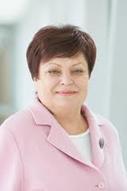
Dr. Giedrė Purvaneckienė
MAIN FINDINGS
* 63.3% of Lithuanian women have been victims of male physical or sexual violence or threats after their 16th birthday.
* 42.4% of all married and cohabiting women have been victims of physical or sexual violence or threats of violence by their present partner.
* 53% of all women who had lived in relationships which had already terminated experienced violence or threats by their ex-partners.
* 11% of Lithuanian women had at least once, after their 16th birthday, been victims of male physical or sexual violence or threats, perpetrated by a stranger, 8.2 % - by a friend, and 14.4 % by an acquaintance or relative.
* 71.4% of Lithuanian women after their 16th birthday have been victims of sexual harassment or sexually offensive behaviour by a stranger, and 43.8% by a known man.
* 26.5% of Lithuanian women after their 16th birthday had experienced sexual abuse by a stranger; 18.2 % by a known man; 17 % were attempted to coerce into sexual intercourse by their date.
* 3.4% of all victimised women reported that the experienced violence did not affect them, the absolute majority reported that this had caused hatred, helplessness, sorrow or other negative emotions.
* 10.6% of the victims reported the most serious incident to the police.
* women who were victimised in their parental families more often were victimised in their marital families; women whose mother was abused by the spouse, more often experienced violence by their spouses; men whose father had been violent against the mother, had been more often violent against their own partner.
* 75.3% of adult Lithuanian women do not feel safe from risk of assault.
* 79% of Lithuanian women believe that the home is the safest place for women and children.
- Bookmark :
- Digg
- del.icio.us
- Stumbleupon
- Redit it
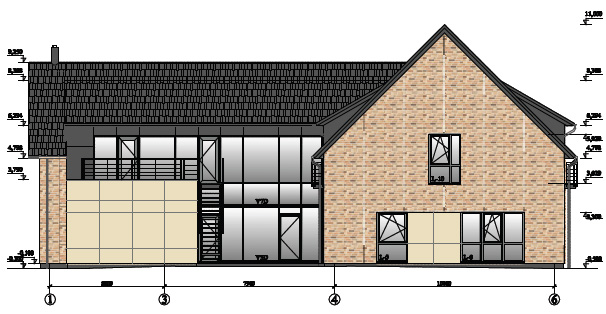
Architects: NEOFORMA, Klaipeda.
Klaipeda municipality wants to be a pioneer-municipality in terms of focus on domestic violence and abuse of women. Lithuania's port city has for years had a women's shelter for women, but has now taken a huge step forward and is already well underway with the planning of what is probably going to be Lithuania's most modern and advanced crisis centre for women. The new centre is expected ready built in early 2012.
The municipality has been joined by the EU and a Danish fund, the Espersen Foundation, to finance the project, and everything is now arranged for Klaipeda to have a women's shelter most other Lithuanian municipalities should study further as soon as possible. For the problem of violence against women is an extremely serious, nationwide problem that needs immediate attention from authorities, communities and the very families throughout every corner of the country!
Let me also say that I consider it admirable that the Espersen Foundation so actively contributes financially and otherwise in a community where the foundation's commercial arm, the Espersen Fish Factory, during the last few years has built up a state of the art fish processing company that provides work to a large number of production workers and several external companies within fishery, transportation and many more. Klaipeda has for years benefited from this company's investments, and the company is now in an exemplary way also showing how commercial businesses can demonstrate social responsibility and involvement in the communities in which they are established and located.
- Bookmark :
- Digg
- del.icio.us
- Stumbleupon
- Redit it
VilNews e-magazine is published in Vilnius, Lithuania. Editor-in-Chief: Mr. Aage Myhre. Inquires to the editors: editor@VilNews.com.
Code of Ethics: See Section 2 – about VilNews. VilNews is not responsible for content on external links/web pages.
HOW TO ADVERTISE IN VILNEWS.
All content is copyrighted © 2011. UAB ‘VilNews’.

 Click on the buttons to open and read each of VilNews' 18 sub-sections
Click on the buttons to open and read each of VilNews' 18 sub-sections 























.jpg)



